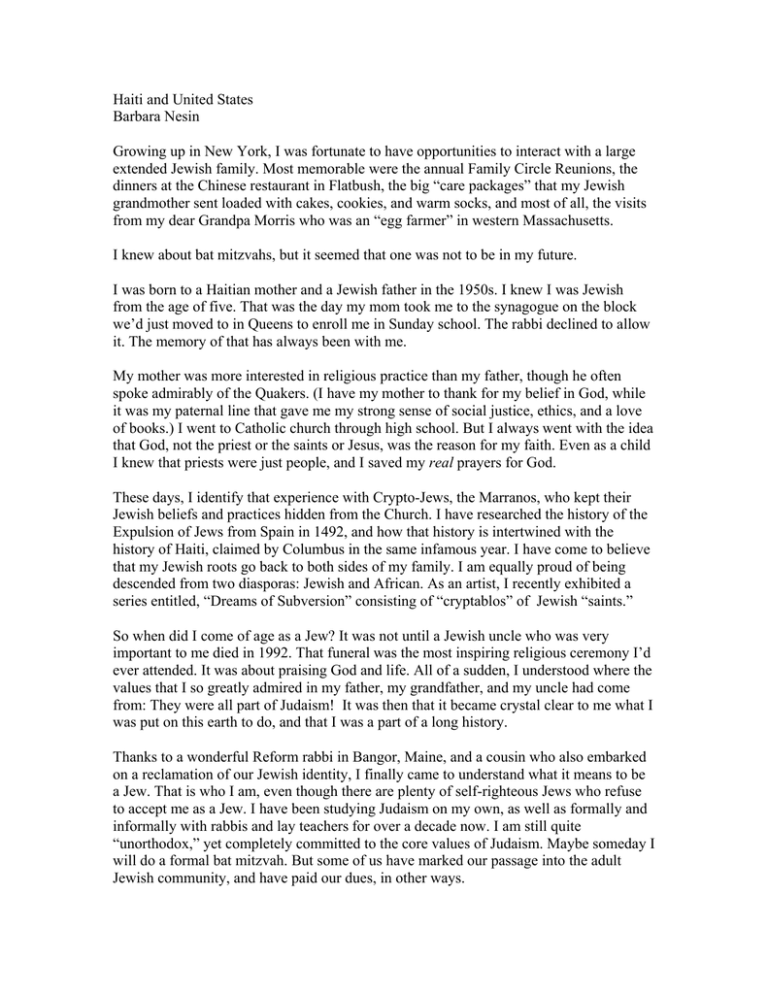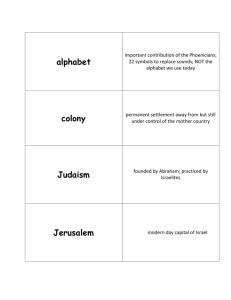Haiti and United States Barbara Nesin
advertisement

Haiti and United States Barbara Nesin Growing up in New York, I was fortunate to have opportunities to interact with a large extended Jewish family. Most memorable were the annual Family Circle Reunions, the dinners at the Chinese restaurant in Flatbush, the big “care packages” that my Jewish grandmother sent loaded with cakes, cookies, and warm socks, and most of all, the visits from my dear Grandpa Morris who was an “egg farmer” in western Massachusetts. I knew about bat mitzvahs, but it seemed that one was not to be in my future. I was born to a Haitian mother and a Jewish father in the 1950s. I knew I was Jewish from the age of five. That was the day my mom took me to the synagogue on the block we’d just moved to in Queens to enroll me in Sunday school. The rabbi declined to allow it. The memory of that has always been with me. My mother was more interested in religious practice than my father, though he often spoke admirably of the Quakers. (I have my mother to thank for my belief in God, while it was my paternal line that gave me my strong sense of social justice, ethics, and a love of books.) I went to Catholic church through high school. But I always went with the idea that God, not the priest or the saints or Jesus, was the reason for my faith. Even as a child I knew that priests were just people, and I saved my real prayers for God. These days, I identify that experience with Crypto-Jews, the Marranos, who kept their Jewish beliefs and practices hidden from the Church. I have researched the history of the Expulsion of Jews from Spain in 1492, and how that history is intertwined with the history of Haiti, claimed by Columbus in the same infamous year. I have come to believe that my Jewish roots go back to both sides of my family. I am equally proud of being descended from two diasporas: Jewish and African. As an artist, I recently exhibited a series entitled, “Dreams of Subversion” consisting of “cryptablos” of Jewish “saints.” So when did I come of age as a Jew? It was not until a Jewish uncle who was very important to me died in 1992. That funeral was the most inspiring religious ceremony I’d ever attended. It was about praising God and life. All of a sudden, I understood where the values that I so greatly admired in my father, my grandfather, and my uncle had come from: They were all part of Judaism! It was then that it became crystal clear to me what I was put on this earth to do, and that I was a part of a long history. Thanks to a wonderful Reform rabbi in Bangor, Maine, and a cousin who also embarked on a reclamation of our Jewish identity, I finally came to understand what it means to be a Jew. That is who I am, even though there are plenty of self-righteous Jews who refuse to accept me as a Jew. I have been studying Judaism on my own, as well as formally and informally with rabbis and lay teachers for over a decade now. I am still quite “unorthodox,” yet completely committed to the core values of Judaism. Maybe someday I will do a formal bat mitzvah. But some of us have marked our passage into the adult Jewish community, and have paid our dues, in other ways.





